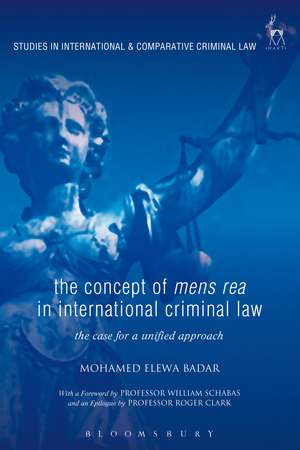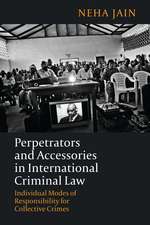The Concept of Mens Rea in International Criminal Law: The Case for a Unified Approach: Studies in International and Comparative Criminal Law
Autor Mohamed Elewa Badaren Limba Engleză Paperback – 24 iun 2015
| Toate formatele și edițiile | Preț | Express |
|---|---|---|
| Paperback (1) | 442.83 lei 6-8 săpt. | |
| Bloomsbury Publishing – 24 iun 2015 | 442.83 lei 6-8 săpt. | |
| Hardback (1) | 956.91 lei 6-8 săpt. | |
| Bloomsbury Publishing – 29 ian 2013 | 956.91 lei 6-8 săpt. |
Din seria Studies in International and Comparative Criminal Law
- 30%
 Preț: 897.55 lei
Preț: 897.55 lei - 21%
 Preț: 275.26 lei
Preț: 275.26 lei - 18%
 Preț: 358.30 lei
Preț: 358.30 lei - 30%
 Preț: 540.65 lei
Preț: 540.65 lei - 27%
 Preț: 345.42 lei
Preț: 345.42 lei - 28%
 Preț: 465.96 lei
Preț: 465.96 lei - 27%
 Preț: 501.70 lei
Preț: 501.70 lei - 14%
 Preț: 603.73 lei
Preț: 603.73 lei - 14%
 Preț: 509.52 lei
Preț: 509.52 lei - 24%
 Preț: 374.34 lei
Preț: 374.34 lei - 11%
 Preț: 374.34 lei
Preț: 374.34 lei - 30%
 Preț: 779.33 lei
Preț: 779.33 lei - 30%
 Preț: 774.62 lei
Preț: 774.62 lei - 30%
 Preț: 893.89 lei
Preț: 893.89 lei - 24%
 Preț: 190.33 lei
Preț: 190.33 lei - 30%
 Preț: 570.02 lei
Preț: 570.02 lei - 18%
 Preț: 302.99 lei
Preț: 302.99 lei - 18%
 Preț: 297.86 lei
Preț: 297.86 lei - 18%
 Preț: 319.86 lei
Preț: 319.86 lei - 30%
 Preț: 603.81 lei
Preț: 603.81 lei - 30%
 Preț: 718.27 lei
Preț: 718.27 lei
Preț: 442.83 lei
Preț vechi: 607.05 lei
-27% Nou
Puncte Express: 664
Preț estimativ în valută:
84.75€ • 92.02$ • 71.19£
84.75€ • 92.02$ • 71.19£
Carte tipărită la comandă
Livrare economică 22 aprilie-06 mai
Preluare comenzi: 021 569.72.76
Specificații
ISBN-13: 9781849469142
ISBN-10: 1849469148
Pagini: 542
Dimensiuni: 156 x 234 x 33 mm
Greutate: 0.79 kg
Editura: Bloomsbury Publishing
Colecția Hart Publishing
Seria Studies in International and Comparative Criminal Law
Locul publicării:London, United Kingdom
ISBN-10: 1849469148
Pagini: 542
Dimensiuni: 156 x 234 x 33 mm
Greutate: 0.79 kg
Editura: Bloomsbury Publishing
Colecția Hart Publishing
Seria Studies in International and Comparative Criminal Law
Locul publicării:London, United Kingdom
Caracteristici
The book is divided into 3 parts and provides an in-depth comparative analysis of different legal systems and the jurisprudence of international criminal tribunals since Nuremberg.
Notă biografică
Mohamed Elewa Badar is a Reader in Comparative and International Criminal Law & Islamic Law at Northumbria University. From 1997-2006 he served as a judge and senior prosecutor for the Egyptian Ministry of Justice.
Cuprins
Foreword William A SchabasPreface 1. Introduction 2. From Vengeance to Mens Rea to Mentes Reae 3. Mens Rea in the Common Law of England and Wales, Australia and Canada 4. Mens Rea in the American Law Institute's Model Penal Code 5. Mens Rea in German and French Criminal Law 6. Mens Rea in Chinese and Russian Criminal Law 7. Mens Rea in Islamic Criminal Law 8. Mens Rea in post-World War II Trials, the Travaux Préparatoire of the Genocide Convention and the Work of the International Law Commission 9. Mens Rea of Crimes in the Jurisprudence of the the Former Yugoslavia and Rwanda 10. The Mens Rea of Perpetration and Participation in the Jurisprudence of the ICTY and ICTR 11. Mens Rea in the Jurisprudence of the International Criminal Court 12. General Conclusions and Recommendations
Recenzii
A parere di chi scrive, in conclusione, il pregio maggiore del lavoro di Badar risiede nella vastità davvero notevole dei materiali plurilingue che Egli è riuscito a raccogliere ed a sistematizzare, soffermandosi pure sulla disciplina della mens rea in alcune tradizioni extra-occidentali finora poco o affatto conosciute alla comunità internazional-penalistica.
The text has been exhaustively researched and fluently written. It contains a most thorough and comprehensive review of the varying conceptions of the mental elements of crimes at the national level.... an invaluable resource for both academics and students of international criminal law. In addition, practitioners of international criminal law will, no doubt, rely on the information and analysis contained therein in their daily work.
The outstanding feature of the book is its broad analysis of the substantive law of several major legal jurisdictions which reveals the much sought after universal value in such a diverse criminal justice system.
Frankly if one had only one book on the principle of mens rea this would be the one to consider as it is not just an academic work, but a practitioner's manual on conceptualizing the full gaunt of this critically important doctrine.
In reading Mohamed Elewa Badar's remarkably comprehensive book about the concept of mens rea in national and international criminal laws, I kept thinking how thrilled I would have been to discover such a book while working at the ICTY. Professor Badar reveals the confusion surrounding mens rea at the international level and proposes to lend some clarity to the concept through comparative analysis. The book makes an important contribution to the literature through its very comprehensive review of mens rea law in many of the word's national legal systems and at international criminal courts and tribunals. The book provides an impressive level of detail with regard to many of the systems it reviews, elucidating not only dominant trends in thinking about mens rea but also conflicts within legal systems. The book also contains some helpful comparative analysis, including, for instance, tables that compare approaches among common law systems. The book's exploration of the international criminal law jurisprudence concerning mens rea is also impressively comprehensive. ...an invaluable resource for practitioners and judges seeking to develop the concept of mens rea in international criminal law. It's rich descriptions of national and international approaches to mens rea facilitate discussion of the most appropriate approaches to the mental elements of international crimes. Just as I would have benefitted greatly from a book of this nature when I worked at the ICTY in 1997, the work of international criminal law practitioners, scholars, and teachers will be enhanced by exposure to Professor Badar's extensive research.
...a very impressive and comprehensive work, strong in all analytical, comparative and dogmatic senses...This book must be strongly recommended to anyone who teaches, researches, or practises in the area of international criminal law or comparative criminal justice.
The text has been exhaustively researched and fluently written. It contains a most thorough and comprehensive review of the varying conceptions of the mental elements of crimes at the national level.... an invaluable resource for both academics and students of international criminal law. In addition, practitioners of international criminal law will, no doubt, rely on the information and analysis contained therein in their daily work.
The outstanding feature of the book is its broad analysis of the substantive law of several major legal jurisdictions which reveals the much sought after universal value in such a diverse criminal justice system.
Frankly if one had only one book on the principle of mens rea this would be the one to consider as it is not just an academic work, but a practitioner's manual on conceptualizing the full gaunt of this critically important doctrine.
In reading Mohamed Elewa Badar's remarkably comprehensive book about the concept of mens rea in national and international criminal laws, I kept thinking how thrilled I would have been to discover such a book while working at the ICTY. Professor Badar reveals the confusion surrounding mens rea at the international level and proposes to lend some clarity to the concept through comparative analysis. The book makes an important contribution to the literature through its very comprehensive review of mens rea law in many of the word's national legal systems and at international criminal courts and tribunals. The book provides an impressive level of detail with regard to many of the systems it reviews, elucidating not only dominant trends in thinking about mens rea but also conflicts within legal systems. The book also contains some helpful comparative analysis, including, for instance, tables that compare approaches among common law systems. The book's exploration of the international criminal law jurisprudence concerning mens rea is also impressively comprehensive. ...an invaluable resource for practitioners and judges seeking to develop the concept of mens rea in international criminal law. It's rich descriptions of national and international approaches to mens rea facilitate discussion of the most appropriate approaches to the mental elements of international crimes. Just as I would have benefitted greatly from a book of this nature when I worked at the ICTY in 1997, the work of international criminal law practitioners, scholars, and teachers will be enhanced by exposure to Professor Badar's extensive research.
...a very impressive and comprehensive work, strong in all analytical, comparative and dogmatic senses...This book must be strongly recommended to anyone who teaches, researches, or practises in the area of international criminal law or comparative criminal justice.
Descriere
Descriere de la o altă ediție sau format:
This book takes a comparative approach to find a unified approach to the doctrine of mens rea in the sphere of international criminal law.
This book takes a comparative approach to find a unified approach to the doctrine of mens rea in the sphere of international criminal law.














